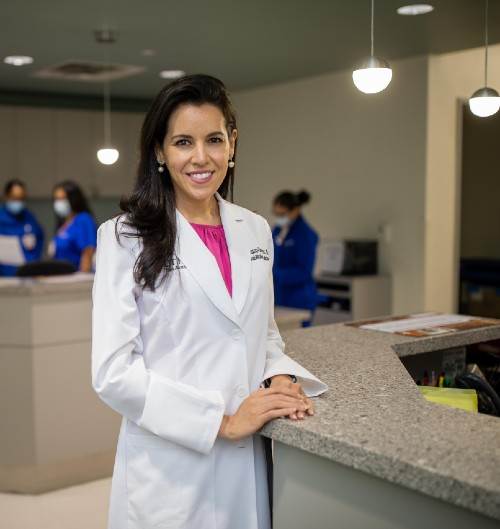
As a national leader in rehabilitation innovation and a designated Traumatic Brain Injury (TBI) Model System by the National Institute on Disability and Rehabilitation Research, the residency program at TIRR Memorial Hermann provided Monica Verduzco-Gutierrez, MD, with the framework needed to care for patients with complex diagnoses.
A TBI Model System of care provides a range of multidisciplinary brain injury rehabilitation services. Components include emergency centers, Level I trauma centers, inpatient rehabilitation hospitals and the opportunity to follow up with a clinical neuropsychologist and other specialists. The skills, philosophies and techniques introduced at TIRR Memorial Hermann through the model system are adopted by residents. TIRR Memorial Hermann also offers outpatient rehabilitation at the TIRR Memorial Hermann Outpatient Rehabilitation – Kirby Glen Center and TIRR Memorial Hermann Outpatient Rehabilitation – The Woodlands, among other locations.
The lessons introduced at TIRR Memorial Hermann are adopted by residents, who go on to practice medicine at hospitals nationwide. Dr. Gutierrez completed her residency in 2009 and continued working at TIRR Memorial Hermann until she moved to San Antonio in 2020. She dedicated her time at TIRR Memorial Hermann to learning about the treatment of neurologic disorders.
“It was a challenging residency with a lot of complicated neurologic patients,” she recalls. “It gave me exposure to unexpected diagnoses; it really prepared me for my career. I was given the support to succeed, so I developed the confidence to practice medicine, particularly with rare cases.”
“During my residency, I looked up to the attending physicians and learned so much from the hospital pharmacists. I participated in feedback loops with nurses and therapists about each patient’s care,” Dr. Gutierrez says. “Even running into a colleague in the hallway could lead to an important revelation about a patient. A big thing about TIRR Memorial Hermann is teamwork.”
Dr. Gutierrez is still in contact with the 11 other colleagues in her residency cohort. “We have a group chat to coordinate meetups at conferences,” she notes. “Some of us communicate on a weekly basis.”
Forming long-lasting connections such as these is important as it fosters interdisciplinary collaboration, allowing for more precise patient care.
Dr. Gutierrez also aims for precision as an educator, using her expertise to train the next generation of doctors. She is currently a professor and the chair of rehabilitation medicine at UT Health San Antonio, specializing in brain injury and neurorehabilitation, and designs her curriculum with each student in mind. A vital component of that curriculum focuses on the many factors that impact patient outcomes. She has notably incorporated nonmedical determinants of health—variables such as language barriers, lack of access to a primary care provider and residence in a rural area—into her hospital rounds and teaches her residents to do the same.
“Learning preferences range from auditory to visual, so I use different methods with different students, such as online aids, flash cards, podcasts, practical experience, questions and case studies,” she explains.
She encourages her students to consider factors such as “Did this patient just lose their insurance coverage?” When considering how to help a patient, Dr. Gutierrez emphasizes listening to concerns, providing education and discussing options to give the patient a sense of control. Superior outcomes occur when including patients in the decision-making process, she says. Accordingly, she teaches her residents to understand where patients of different backgrounds are coming from.
“I put effort into creating doctor−patient relationships built on trust, and that’s something I learned during my residency at TIRR Memorial Hermann,” Dr. Gutierrez notes. “You don’t want me as your doctor until you’ve had a catastrophic or life-changing neurologic event. Then, you want me. I teach my residents to consider the patient perspective.”
At TIRR Memorial Hermann, she notes, residents experience an environment that is supportive for both patients and health care professionals, and that is something she now tries to foster in her own work with future physicians. Part of that, according to Dr. Gutierrez, involves instilling in her residents a love of learning, a “don’t settle” mentality, and a single question to always consider: “What can we do to help our patients?”
